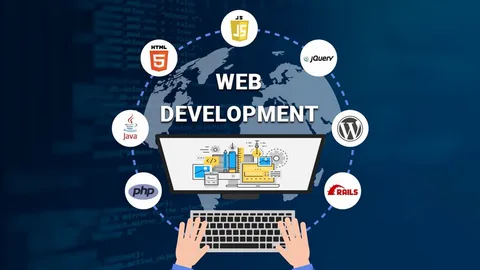In today’s rapidly evolving digital landscape, mobile applications have become an integral part of our daily lives. From ordering food and hailing rides to managing finances and staying connected with loved ones, mobile apps have revolutionized the way we interact with technology. As businesses strive to stay competitive in this digital era, the demand for high-quality mobile application development services is on the rise. In this comprehensive article, we will explore the world of mobile application development services, delving into their significance, the development process, key considerations, and much more.
Introduction
Mobile applications development outsourcing have transformed the way businesses engage with their customers. As smartphones continue to dominate the digital landscape, having a well-crafted mobile app is no longer a luxury but a necessity. In this article, we will dive deep into the world of mobile application development services, exploring the intricacies of creating user-friendly and high-performing apps.
Understanding Mobile Application Development
2.1 What Are Mobile Applications?
Mobile applications, often referred to as mobile apps, are software applications designed to run on smartphones, tablets, and other mobile devices. These apps serve various purposes, from entertainment and productivity to e-commerce and social networking.
2.2 The Importance of Mobile Apps
The significance of mobile apps in today’s world cannot be overstated. They offer businesses a direct and personalized way to connect with their target audience, enhance brand visibility, and improve customer engagement. In a world where people spend a substantial amount of their time on mobile devices, having a well-designed app can make all the difference.
The Mobile App Development Process
Creating a successful mobile app is a meticulous process that involves several stages. Let’s break down the development journey.
3.1 Ideation and Planning
Every great app starts with a brilliant idea. During this phase, developers brainstorm concepts, define the app’s purpose, and outline its features and functionalities. Thorough market research is essential to understand user needs and competition.
3.2 Design and Prototyping
Design is a crucial aspect of mobile app development. This step involves creating wireframes and prototypes to visualize the app’s layout and user interface. Designers focus on ensuring an intuitive and visually appealing user experience.
3.3 Development and Coding
Once the design is finalized, developers get to work. They write the code that brings the app to life, ensuring it functions seamlessly on various devices and platforms. This phase demands attention to detail and coding expertise.
3.4 Testing and Quality Assurance
Testing is vital to identify and fix bugs, glitches, and usability issues. Rigorous quality assurance ensures that the app performs flawlessly and provides an optimal user experience.
3.5 Deployment and Launch
After extensive testing and refinement, it’s time to launch the app on app stores like Apple’s App Store and Google Play. This stage requires careful submission and adherence to platform guidelines.
Types of Mobile Applications
Mobile apps come in different forms, each with its unique characteristics and advantages.
4.1 Native Apps
Native apps are developed for specific platforms, such as iOS or Android, using platform-specific languages. They offer superior performance and access to device features.
4.2 Web Apps
Web apps are accessible through web browsers and do not need to be downloaded. They are platform-independent but may have limited offline functionality.
4.3 Hybrid Apps
Hybrid apps combine elements of both native and web apps. They can run on multiple platforms and offer a balance between performance and versatility.
Choosing the Right Development Platform
5.1 iOS vs. Android
Choosing between iOS and Android development depends on your target audience and business goals. Each platform has its strengths and considerations.
Key Features of Successful Mobile Apps
Successful mobile apps share common features that contribute to their popularity and usability. These include intuitive navigation, responsiveness, and regular updates.
Cost Considerations
The cost of developing a mobile app can vary widely based on complexity, features, and the development team’s location. It’s crucial to budget carefully and plan for ongoing maintenance.
Benefits of Outsourcing Mobile App Development
Outsourcing mobile app development can be a strategic decision, offering cost-efficiency and access to a pool of skilled developers.
The Future of Mobile App Development
The future of mobile app development holds exciting possibilities, including augmented reality integration, AI-driven experiences, and enhanced security measures.
Security and Privacy
With the increasing reliance on mobile apps, ensuring the security and privacy of user data is paramount. Developers must prioritize robust security measures.
User Experience (UX) Design
Creating an exceptional user experience is at the heart of successful mobile app development. User-centric design principles lead to higher user satisfaction.
Marketing and Monetization Strategies
Effectively marketing and monetizing your mobile app is crucial for its success. Explore strategies such as in-app advertising, subscriptions, and partnerships.
Case Studies: Success Stories
Examining real-world examples of successful mobile apps can provide valuable insights and inspiration for your own project.
Common Challenges and Solutions
Mobile app development is not without its challenges. Explore common hurdles and discover effective solutions to overcome them.
Conclusion
15.1 Recap
Mobile application development services play a pivotal role in the digital age, enabling businesses to connect with their audience in a meaningful way.
15.2 Embracing the Mobile Revolution
As the mobile landscape continues to evolve, staying ahead of the curve in mobile app development is essential for businesses looking to thrive in the digital era.
Frequently Asked Questions (FAQs)
- **What is the typical cost of developing a mobile app?The cost of developing a mobile app can vary widely depending on its complexity and features. On average, it can range from a few thousand dollars to several hundred thousand dollars.
- **How long does it take to develop a mobile app?The development timeline for a mobile app depends on its complexity



